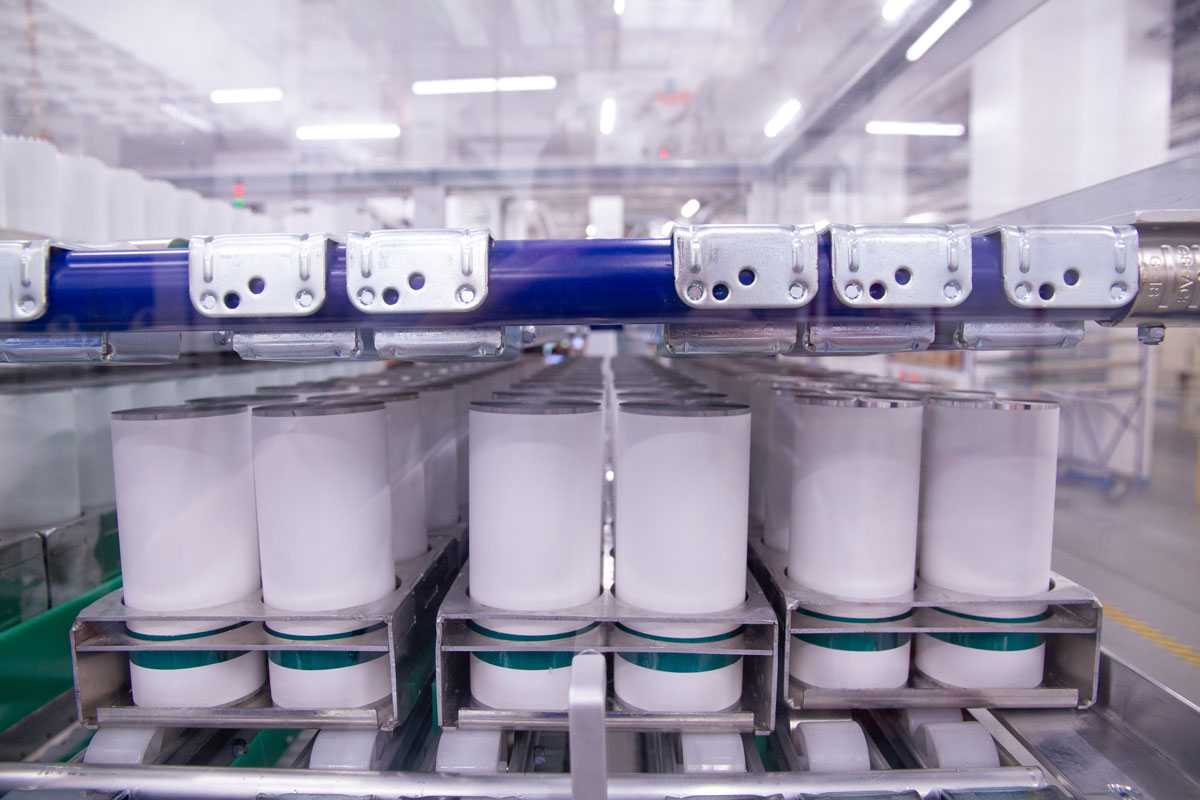At this years’ prestigious Hugo-Junkers-Prize for research and innovations from Saxony-Anhalt, Black Magic GmbH, a subsidiary of Skeleton Technologies, won the 2nd place in the category for „Most innovative projects in the field of mobility and logistics”.
The Skeleton Technologies production facility is located in Großröhrsdorf, Germany, but a big part of the raw material R&D and innovation takes place in the Black Magic facility in Bitterfeld, Germany. Within Skeleton Technologies, Black Magic focuses on material development and scaling of the synthesis process for our magic material “curved graphene”, and it is the only company in Europe producing the material.
Black Magic already is world market leader in synthesizing capacity according to Dr. Sebastian Pohlmann, Head of Cell Development at Skeleton Technologies. In the future, the black powder from the Bitterfeld production facility will be delivered to Großröhrsdorf for production of ultracapacitor energy storage solutions.
„We are delighted about being awarded the 2nd prize of the competition, especially with such strong competitors. This prize is the right signal to a young company like us and shows that we are on the right path. With every single kg of our material, 20 tons of CO2 can be saved and it is our vision to produce as soon as possible in industrial scale in Saxony-Anhalt.”, says Dr. Pohlmann.
The market for ultracapacitors is growing very fast and it’s driven by the global need to electrify and be more energy efficient. Skeleton Technologies’ decision to locate Black Magic in Saxony-Anhalt is proving to be the correct decision as proven by this award.
Skeleton Technologies’ production facility in Grossröhrsdorf, Germany, is located in a cluster of high-tech manufacturing companies, in an area known colloquially as Silicon Saxony. In fact, the availability of skilled workforce and existing infrastructure were some of the key reasons behind Skeleton deciding on the location of the new production facility in Saxony.
Ants Vill, Skeleton Technologies’ VP of Product, has been in charge of setting up Skeleton’s first production line in Estonia, and in 2017, together with his team planned and engineered the move to Germany. Mr Vill explains the complexities of ultracapacitor production:
“Although ultracapacitors are relatively simple devices – just aluminium, carbon, paper, and an electrolyte – it’s difficult to make consistently high quality products. In our case it’s even more difficult, because we also produce modules and systems, which get progressively complicated, and quite often need to be customized to meet customer requirements. The move to Germany enabled a complete redesign of our production line to put even more emphasis on quality and automation, and it has paid off.”
featured image: Custom-designed German machinery fills the floor at Grossröhrsdorf, enabling consistently high quality electrode and calendering process. image credit: Skeleton Technologies
While already impressive and the largest ultracapacitors factory in Europe, we are working on increasing the manufacturing capacity for the Grossröhrsdorf production facility from half a million to about 1,000,000 ultracapacitors per year in 2020. In terms of footprint, the current 3,500 square meters will be double to about 7,000 square meters by 2020.
Following the scale-up, the plan is to implement the next generation cell design, optimized for automated production and cell assembly. Further automation enables scaling up production capacity to 4,000,000 cells in the first phase, and ultimately to 10,000,000 ultracapacitors to meet demand from automotive, grid, and transportation.

As far as electrode manufacturing capacity goes, already in 2017 we were producing the equivalent of 2,000,000 ultracapacitors worth of electrode, and can easily double production to 4,000,000 cell equivalents.
The custom-design electrode mixing unit in Grossröhrsdorf is currently scaled to about 4,000,000 ultracapacitor cells, fully automated, and highly likely the most advanced mixing unit in the industry. The unit was designed and developed together with an industry specialist system manufacturer to reach faster cycle times than standard machinery can achieve.
One of the key capabilities we possess is laser-welding, which makes it possible to design a huge variety of sizes and shapes for ultracapacitor modules. On top of in-house laser-welding, we also do all module and systems design an assembly in-house. All of these capabilities are something none of our competitors offer, and provide unparalleled flexibility and quality to our customers.
Our module and systems production capacity can be quickly increased by adding lean workstations. The current nominal capacity for for example a 18-cell 48V system is about 500,000 modules per year for the laser-welding machinery, but will of course increase in parallel with the scale-up of the factory.
Industry 4.0 and full automation
Working together with large automotive OEMs, global industrial giants, and national grid operators demands a high level of quality control and constant upgrades and improvements in the production process.
The scale-up of our Grossröhrsdorf production facility to a fully automatized factory utilizing industry 4.0 quality control and production settings is no small feat for a company as young as ours. With the most modern and one of the largest ultracapacitor factories anywhere in the world, Skeleton is ideally positioned to drive electrification in industries across the board for years to come. A smart ultracapacitor factory is the key element in competing with the cost-down trend in electrification and electric vehicle production.
“In two years we have built the most modern and efficient ultracapacitor factory in the world, and the scale-up plan will increase our capacity to meet the demand created by electrification. The success of Skeleton is based on a commitment to high-quality manufacturing, and combining German engineering and production know-how with Estonian IT expertise”, Ants Vill concludes.